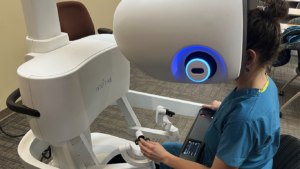Five years ago, you would have been called crazy if you said computers would be driving cars down Chandler Boulevard today. This prediction is steadily turning into a reality as technology companies test autonomous vehicles in Metro Phoenix.
“I was with Steve Wozniak four years ago,” says Chris Camacho, president and CEO of the Greater Phoenix Economic Council. “I asked him what he was spending his time on. He said, ‘By 2018 you’ll see autonomous vehicles on the road.’ And at the time, we didn’t know what that term was. But here we are today, seeing very wide-scale deployment right here in Arizona.”
Arizona has always been known as a testing ground for vehicles. Demand for autonomous vehicles, which could unleash a new world of safe commuting by car, has been growing, and Arizona is in a position to lead the way for testing as other parts of the country vie to be the next hub for this technology.
“Phoenix is charting a course of attracting innovators, so it’s no surprise when companies choose Phoenix to showcase the latest advances in technology,” says Phoenix Mayor Greg Stanton. “Phoenix welcomes the endless possibilities this technology can bring to our city.”
The signs of success
In the early stages of public autonomous vehicle testing, Gov. Doug Ducey issued his support for autonomous vehicle testing in Arizona through an executive order in 2015. The governor directed all Arizona state agencies with regulatory jurisdiction that may affect driverless vehicles to support the testing and operation of autonomous vehicles in Arizona.
“As soon as Gov. Ducey allowed autonomous vehicles, he saved us a lot of headaches,” says Ashraf Gaffar, assistant professor and honors faculty at ASU’s School of Computing, Informatics and Decision Systems Engineering.
The executive order limited the bureaucracy that could interfere with autonomous vehicle research and testing
in Arizona, while also enabling researchers at ASU like Gaffar to aggressively pursue their work.
Gaffar says fully autonomous vehicles
for the masses won’t be happening any time soon but that doesn’t mean we can’t make the current cars on the road smarter in the meantime.
His work is helping create the next generation of autonomous vehicle engineers, who are working on systems in school that they’ll go on to utilize in the real world.
“Students benefit in return by being able to go out, especially and specifically for the automotive industry, and tell them, ‘Hey, we’re not going to just claim that we know programming. We know how to program and build an intelligent vehicle,’’’ Gaffar says.
Gaffar’s students have gone to work for large automotive companies like Ford and Tesla, which are mostly out of state, but Gaffar has also had students go on to work with Intel and its autonomous vehicle program in Chandler.
With autonomous vehicles, Gaffar and his students are working to create an “intelligent co-driver,” which will provide an in-depth analysis of how an autonomous vehicle performed, while also providing a safety system for the vehicle in the event it isn’t performing properly.
He is also working to create a co-driver that can take over the vehicle — semi-autonomously or fully depending on the situation — when the driver becomes distracted. This technology can be integrated into existing hardware found in modern cars, Gaffar says.
The National Science Foundation recently qualified him for a program called Innovation Node so he can work with potential business partners and sponsors to commercialize his work.
ASU’s infrastructure is also conducive to bringing and attracting more autonomous vehicle players, besides the ones already testing here, such as Waymo and Uber. There is plenty of space near ASU’s campus for researchers, Gaffer says, and the school is home to simulation labs that help his research and could be utilized by others.
It’s a very exciting time to be working on autonomous vehicle research in Arizona, Gaffar says. And Bill Gates’ plan to create a smart city near Tonopah will only boost the region’s autonomous vehicle momentum, he says.
The Waymo effect
In the early part of 2016, Waymo, a spin-off from the Google parent company Alphabet, came to Metro Phoenix to start testing its autonomous vehicles. Waymo was attracted to the region due to its welcoming attitude toward innovation and the fast growth of the state, says Tekedra N. Mawakana, global head of policy and government affairs for Waymo.
At the time, Waymo thought it would be the perfect opportunity to start educating the public about autonomous vehicles, so the company found local community partners — such as the Foundation for Blind Children and East Valley Partnership — to launch the nation’s first awareness campaign about the technology in Arizona, Mawakana says.
Waymo also hopes to play a role in assisting Metro Phoenix’s transportation needs, she says. The area already has a robust transit infrastructure with easy access to a variety of options like light rail, biking, ride-sharing and more, but adding another element with self-driving vehicles could bolster the region’s ease of accessibility.
“I can tell you, as a working mom, actually having a car that could pick up my son and take him to soccer practice and bring him back home where I can have dinner ready — that would be amazing,” Mawakana says.
Waymo has deployed its early driver program in the Valley, which allows regular citizens to hail Waymo’s vehicles to transport them around the Valley. Mawakana says Waymo is learning a great deal about how people would use self-driving cars in the future from the program.
In the late part of the 2017, Waymo announced that some of its vehicles in the Chandler region would start driving without a human driver behind the wheel. Before the announcement, Waymo’s vehicles drove with a test driver behind the wheel, who were ready to take command of the vehicle in the event of a vehicle error.
“We’ve now determined that we’re ready to remove the test driver in Chandler, where we’ve tested most extensively,” Mawakana says. There will still be cars driving with test drivers behind the wheel, she adds.
In the next few months, Waymo will be inviting its early riders into its vehicles in the Greater Phoenix area that won’t have a test driver behind the wheel, Mawakana says.
After a feedback period, Waymo plans to start inviting the public into its autonomous vehicles through a commercial service right here in Arizona, Mawakana says.
“Both autonomous vehicles and the increased use of ride-sharing services will likely serve to lessen the parking requirements for future commercial real estate projects,” says Sharon Harper, president and CEO of Plaza Companies and GPEC board member. “This is great news for developers and for the economy, as structures are expensive to build. The impact of autonomous vehicles could dramatically affect how people travel to and from work, which would have a ripple effect on how commercial office and retail projects are built.”



